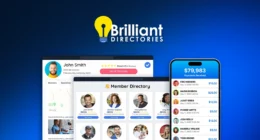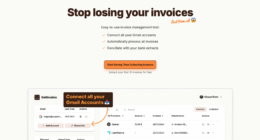Leading marketing software platforms like HubSpot and Salesforce Marketing Cloud offer extensive solutions for businesses of all sizes. These tools provide essential features including automated email campaigns, lead scoring, and multi-channel marketing capabilities. Popular options range from Hootsuite for social media management to ContentStudio for cost-effective content marketing. Key metrics show marketing teams save 6-10 hours weekly through automation, while reducing operational costs by up to 30%. Understanding the detailed features and performance metrics helps businesses make informed platform selections.
Quick Overview
- HubSpot and Salesforce Marketing Cloud lead the industry by offering comprehensive solutions for marketing, sales, and customer service integration.
- Automated marketing platforms save teams 6-10 hours weekly and reduce operational costs by up to 30% annually.
- ContentStudio provides cost-effective solutions for small businesses, while Adobe Experience Manager suits enterprise-level organizations.
- Key performance metrics include email open rates (15-25%), click-through rates (2-5%), and inbox delivery rates above 95%.
- Implementation costs, user adoption rates, system compatibility, and technical support availability are crucial factors when selecting marketing software.
Understanding Top Marketing Software Platforms

Marketing software platforms serve as essential tools for modern businesses seeking to streamline their digital marketing efforts. Several leading platforms offer exhaustive solutions to meet diverse marketing needs.
Industry leaders like HubSpot and Salesforce Marketing Cloud stand out by providing all-in-one solutions that combine marketing, sales, and customer service capabilities. For specialized needs, platforms like Hootsuite excel in social media management, while Shopify and WooCommerce focus on e-commerce marketing. Analytics-focused tools such as Google Analytics and Tableau help businesses make data-driven decisions. These platforms enable unlimited customer segmentation to create highly targeted promotional campaigns that resonate with specific audience groups.
The emergence of AI-powered platforms, including Brevo and Drift, has introduced advanced features like predictive analytics and automated personalization. Successful implementation requires establishing business goals first before selecting specific marketing tactics or tools. These innovations allow marketers to create more targeted campaigns while saving time through intelligent automation and improved customer insights.
Essential Features and Benefits of Marketing Tools
Modern businesses depend on a robust set of marketing software features to effectively reach and engage their target audiences. Key features include automated email campaigns, lead scoring systems, and multi-channel marketing capabilities that streamline communication across various platforms. Popular platforms like Trello and Asana help teams organize tasks and track progress efficiently.
Marketing tools offer essential functionalities like content management with user-friendly templates, SEO optimization features, and thorough analytics dashboards. These solutions enable teams to track campaign performance, measure ROI, and gather valuable audience insights. Additionally, personalization tools help create targeted messaging through audience segmentation and interactive campaigns.
The most effective marketing platforms also provide seamless integration options with CRMs, payment systems, and e-commerce solutions. Cloud-based accessibility guarantees teams can collaborate efficiently while managing campaigns from anywhere, making these tools indispensable for modern marketing operations.
Comparing Content Marketing Solutions

Today’s content marketing landscape offers businesses a diverse array of software solutions, each designed to address specific organizational needs and challenges. Leading platforms like ContentStudio and Sanity serve different market segments, with options ranging from user-friendly tools to developer-focused solutions.
For enterprise needs, Adobe Experience Manager delivers robust personalization and analytics, while smaller businesses often find ContentStudio’s cost-effective approach more suitable. For instance, with over 60,000 users, ContentStudio has proven to be a trusted choice for publishers, brands, and startups alike. Sanity and Dato CMS cater to teams requiring extensive customization and API access. Companies seeking detailed insights into their content performance can leverage real-time analytics through platforms like Adobe Analytics. Storyblok stands out for its modular content management, making it ideal for businesses focusing on localization.
Common challenges include complex setups, particularly with advanced platforms like Adobe and Sanity, along with integration issues across third-party applications. The industry continues to evolve, with increasing emphasis on AI integration and headless CMS solutions.
Marketing Automation Platform Performance
While content management solutions focus on organizing and delivering material, the effectiveness of automation platforms reveals itself through measurable performance metrics and operational gains. Marketing teams typically save 6-10 hours weekly through automated processes, while reducing operational costs by up to 30% annually. Modern automation platforms rely heavily on customer lifetime value to make data-driven decisions about marketing investments.
Key performance indicators demonstrate automation’s impact through email open rates (15-25% benchmark), click-through rates (2-5% standard), and conversion metrics. Successful platforms maintain inbox delivery rates above 95% while managing multiple campaigns simultaneously. They also streamline lead tracking and customer engagement across channels.
However, organizations must address common challenges like data accuracy, integration complexity, and content fatigue. Regular optimization through A/B testing and careful monitoring of unsubscribe rates helps maintain engagement levels and certifies maximum ROI from automation investments.
Key Considerations Before Investing in Marketing Software

Before committing to marketing software investments, organizations must carefully evaluate several critical factors that influence long-term success and ROI. Financial considerations extend beyond initial costs to include training, maintenance, and potential scaling expenses. The implementation of advanced marketing automation helps streamline campaign management and lead generation processes. Popular platforms like HubSpot and Marketo offer comprehensive solutions for email marketing and lead management. Security measures, user adoption rates, and system compatibility play vital roles in determining the software’s effectiveness within existing operations.
- A marketing team analyzing colorful dashboards on large screens, confidently making data-driven decisions.
- IT specialists seamlessly connecting various software platforms through a central hub.
- Team members easily traversing intuitive interfaces during their daily workflow.
- Security protocols actively protecting sensitive customer data with encrypted shields.
- Technical support staff providing prompt assistance through video calls and chat.
These key aspects help organizations make informed decisions while avoiding costly mistakes in their marketing technology investments.
Frequently Asked Questions
How Long Does It Typically Take to See ROI From Marketing Software?
Most businesses typically see ROI from marketing software within 6-12 months of implementation. The timeline varies based on several factors, including industry competition, business size, and chosen marketing strategies.
While PPC campaigns and marketing automation tools often deliver faster results, strategies like SEO take longer but provide sustainable returns. Companies with longer sales cycles, particularly in B2B sectors, may need 8-12 months or more to realize significant ROI.
Can Marketing Software Integrate With Existing Legacy Systems and Databases?
Yes, marketing software can integrate with legacy systems and databases, though the process varies in complexity.
Modern integration platforms offer pre-built connectors and APIs that facilitate seamless data exchange between new and old systems.
While technical challenges may arise, solutions like middleware and iPaaS platforms help bridge the gap.
Organizations can maintain their existing infrastructure while adding new marketing capabilities, though proper security measures and data mapping are essential for successful integration.
What Security Measures Protect Customer Data in Marketing Platforms?
Like a fortress protecting its treasures, modern marketing platforms employ multiple layers of security to safeguard customer data. These platforms utilize robust encryption methods, both for stored data and information in transit, using protocols like AES-256.
Access control measures, including role-based permissions and multi-factor authentication, restrict data access to authorized personnel only. Additionally, thorough vendor assessments and regular employee security training guarantee consistent protection of sensitive customer information across all touchpoints.
How Often Should Marketing Software Be Updated or Replaced?
Marketing software should be updated monthly to maintain ideal performance and security, aligning with industry standards where 73% of top applications receive monthly updates.
Full replacement typically becomes necessary every 3-5 years when software shows signs of:
- Diminished performance or scaling issues
- Integration difficulties with newer systems
- Rising maintenance costs
- Outdated interfaces affecting productivity
- Security vulnerabilities
Regular performance reviews every 6-12 months help determine if updates are sufficient or replacement is needed.
Are There Industry-Specific Marketing Software Solutions for Niche Markets?
Yes, numerous industry-specific marketing software solutions exist for niche markets.
Healthcare providers use HIPAA-compliant platforms for patient engagement, real estate firms leverage tools with virtual tour capabilities, and manufacturers utilize B2B-focused solutions. These specialized tools offer targeted features like donor management for nonprofits and cart abandonment tracking for ecommerce. Each solution provides customized analytics, compliance features, and integrations designed specifically for its intended industry’s unique requirements.
Conclusion
Selecting the right marketing software can transform a struggling business into a lead-generating powerhouse capable of reaching millions overnight. By carefully evaluating features, costs, and integration capabilities, companies can identify tools that align with their specific needs and growth objectives. Remember to test platforms through free trials, read authentic user reviews, and consider scalability before making this vital investment in your organization’s digital marketing infrastructure.








